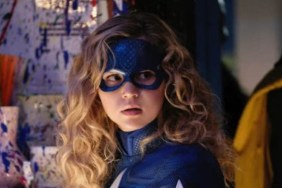
In a world where comic book based movies are thought of as men (or women) in tights or genre anomalies like Frank Miller’s Sin City, there once was a comic book movie called Ghost World, which was able to stand apart from the rest of the pack even five years later.
Adapted by director Terry Zwygoff (Bad Santa) from the comic strip originally serialized in Daniel Clowes’ comic anthology “Eightball,” Ghost World became a phenomenon even before they were nominated for an Academy Award for its screenplay. At the same time as Clowes’ comic work started finding newfound attention, he was also suddenly becoming an in-demand screenwriter in Hollywood.
Now, the duo have reunited for Art School Confidential, a new story derived from the title of one of Clowes’ short comic strips. It’s about a shy young artist named Jerome (Max Minghella) who suddenly finds his dreams of becoming a great artist unraveling, as he attends art school where he learns how the world of art really works. It co-stars producer John Malkovich, Jim Broadbent, Anjelica Huston and Ethan Suplee.
In this rare, extensive interview with ComingSoon.net/SuperheroHype.com, eclectic comic artist Daniel Clowes talked about his new movie, his upcoming projects and his other interests.
CS/SHH: Was any part of “Art School Confidential” taken from the original comic story of that title?
Clowes: Really, all we got from the short story was the title and the idea of doing something set in art school. The producer who produced “Ghost World” had a terrible ordeal getting somebody to make “Ghost World” with that title. These people were like, “Where’s the ghost? I read 80 pages of it and there’s no ghost!” She liked [the title] “Art School Confidential” because it was completely literal. You get where’s it set, and you get what it’s about. So that’s what we have: a title and a place, a setting and that’s all I took from there. I told her I could write any number of miniseries about art school, because I had so many thoughts about it and I remember it so vividly. The first thing that popped into my head was, “What would be the plot of the thing?” I thought about the movie “High School Confidential,” which is where I took the title, obviously. Basically, Russ Tamblyn is an undercover jock in high school trying to bust up a drug ring, so I thought, “What if this kind of thing applied to art school?” That would be a much different situation. Originally, that was more of an event that propelled me through the script and then it submerged more and more as my own issues came to the forefront.
CS/SHH: Is the film at all autobiographical?
Clowes: The whole film is at least emotionally autobiographical. It’s really about what an artist has to go through in terms of deciding how he’s going to go with his career. Do you wanna follow the direction that you’re naturally-inclined to go or do you want to go toward success and fame and do something that people are going to notice? In Jerome’s case, he’s doing these portraits that he’s very happy with, but nobody’s paying any attention to them. You try to turn that off in yourself. You try to only do what you think is purely yours, but it’s impossible to control that little part of your brain telling you, “No, go in this direction, because everybody will like it better.”

CS/SHH: How many of the characters were actually based on people you’ve known? For instance, did you know someone like Jim Broadbent’s angry drunk has-been?
Clowes: There were several. There was no one who was exactly that guy, but there were several guys who combined to be that guy. We had a guy who was a very angry World War II veteran in Brooklyn, who was upset at how the neighborhood had changed. He was always talking about how he wanted to get out his old army gun and kill everybody. He was really an angry guy, but he was not an artist. Then there was this other guy, who was an artist, who had graduated 20 year earlier and stuck around the neighborhood. He would always kind of troll around trying to pick up art girls and stuff and he was really, like, just the most bitter, angry, failed artist. Any artist you’d bring up in the field was the worst scum of the earth, not a good word to say about anybody except for people who have been dead for 500 years.
CS/SHH: Do you have any regular contact with any of those people these days?
Clowes: Not anymore, no. There are people we found interesting as young artists. You heard that this guy is an actual magazine illustrator, who has done work and got paid for it. It seemed so exotic, like a celebrity, and then you see him sitting around in his pajamas all day watching game shows and he’s really angry.
CS/SHH: What was it like working with Terry Zwigoff for a second time and how was it different writing this screenplay yourself?
Clowes: In the first film, we were kinda figuring out what our roles were. He had never made a real feature film, only documentaries, which is a very different enterprise. I had done none of it, only written comics. We started writing the script together and, at first, we were trading off scenes. He was more interested in the Steve Buscemi character and knew all about the record collectors, so he’d write all that stuff. Then that was all used up and it was all Enid and Rebecca, which is 75% of the film, and he was like, “I can’t write those characters. They’re your characters.” So I wound up continuing on as the writer. By the time we were in preproduction, I kind of rose as the predominant writer of the two of us, and he was directing. For the second one, it was never even discussed that we would write it together.
CS/SHH: Did you have any of the specific actors in mind while you were writing the script?
Clowes: Only John Malkovich, because he produced “Ghost World” and at the end of that, he said that it would be great if we had something for him in the next one. That’s the only part I’ve ever written with an actor in mind. He asked me, “Is this how you see me?” but he made it pretty 3-dimensional. Jim Broadbent—I had no thought of any actor like that at all. I thought that character would be more like an American, middle-aged, almost a sitcom-actor-gone-bad. That was the vision I had, and Terry instantly came up with Jim Broadbent. At first, I thought that’s crazy, and then I realized that was pure genius. It works really well.
CS/SHH: Did any of the actors typify what you consider the Daniel Clowes sensibility?
Clowes: They all do, to some degree. They’re all Terry Zwigoff’s thing, as well. We have a crossover, and there’s this very large area where we sort of share this similar vision and they fit within that range. I was pretty much happy with almost every single actor in the film.

CS/SHH: Why do you think the strange characters you create are so appealing to certain people?
Clowes: I see certain characters absolutely click with a fairly big audience, and other ones they cross some line. I think that’s what I’m always trying to do, kind of approach this line of like “where does my thing end and the public thing’s begin?” Where is there a crossover where the public will understand what I’m trying to do, and where is that crossover to the point where only 5 people understand it? I’ve done comics that certainly cross the line where everybody goes, “Yeah, what was that all about?”
CS/SHH: So, you’re not trying to cross the line?
Clowes: No, I just kinda want to see where it is. I’m looking for the edge. Because crossing the line, you end up doing triangle paintings like Professor Sandiford, where nobody’s interested.
CS/SHH: Were you on the set during the production?
Clowes: On “Ghost World”, Terry kinda wanted me around because he was somewhat unsure of what Enid’s room would look like and these little details like her sketchbook. I wound up sticking around. I didn’t have an agent at the time, but when I hired my agent, I said, “Yeah, I was on ‘Ghost World,’ just there the whole time,” and he asked why I wasn’t a producer, so on this one, I asked if I could be a producer, so then I got a producer credit, and I did exactly the same thing.
CS/SHH: Did you get at all into the production design, as far as the characters?
Clowes: Since it wasn’t really based on a comic, I couldn’t write the movie without having visual ideas what the characters looked like, so I did a sketchbook with the drawing of every single character and what clothes they wear. I wound up showing that to the costume people, and I think it was a much a problem as it was a help. I think it was confusing to people because it’s a person making up how the characters look and then we’d hire actors that look very different. I’m not sure it was helpful, but I think it was helpful to Terry to get an idea who these guys were.
CS/SHH: Is there any pressure between you and Terry to have success with the movie, at least on the level of “Ghost World”?
Clowes: For us, with “Ghost World,” we felt like we made a successful film, but it certainly didn’t feel like we made a big imprint on the psyche of the American public. To this date, I’ve still never met a single stranger who has ever heard of it, let alone seen it. I’ve never sat on a plane next to somebody who has heard of it even in casual conversations with friends. To natives of New York, it was a phenomenon to some degree. You look through lists of the films per year, you see films that made money in the range that “Ghost World” did from 5 years ago and you’ve never heard of them or you barely remember them. It’s hard to feel like we made a huge imprint on the world, but then, Terry made “Bad Santa,” which made, like, $70 million, so that’s a real film. So Terry’s going back to making a smaller film, and I’m just making the same kind of thing that I always do. [laughs] There’s no real sense of anything beyond that.

CS/SHH: I understand that you’re doing a movie, once titled “Backyard Resistence,” about the guys who remade “Raiders of the Lost Ark” in their backyard. How did that come about?
Clowes: Yeah, I am doing that. I’m working on the script right now. There was an article in Vanity Fair about these three guys, and it was one of those few things that happen about once a year where all my friends call me up and say, “There’s this article that reminded me of something you’d really like. You gotta read this article.” Finally, I did and thought, “Man, that’s a great story. I’d do anything to see this movie these guys made.” My agent called me and said they were developing a film, so I said I’d take the job if I could get a VHS copy of it. It just blew me away what these kids have done. It was just a very emotional film. It’s like you’re seeing their adolescence onscreen, they go from 12 to 18 on film, and I found it very moving. I ended up watching it over and over. I got to meet the guys, and it’s really been a lot of fun to do. It’s in endless rewrites, which is how Scott Rudin works–you just rewrite, rewrite, rewrite–but it’s in a good place, I think.
CS/SHH: Did you come up with a new title for it yet?
Clowes: You know, I can’t come up with a title, so I’m leaving that to whoever comes up with titles. I’m really not that great with titles, somehow. I guess because it’s not my story. Usually, I have a title and that’s the starting point for a lot of things. With this one, it’s really about these guys and I don’t want the title to seem like it’s my thing; I want it to seem like it’s about them.
CS/SHH: You’ll also be working with Michel Gondry on his adaptation of “Master of Space and Time”?
Clowes: Yeah, at some point. He’s got another film he wants to do fairly soon and then after this Raiders thing, I’ve got another thing that I’m hoping to start that I don’t want to jinx by talking about it. It may be a while before we get to that, but I’d love to work on that.
CS/SHH: Were you a fan of the book?
Clowes: He called me up and sent me a copy of the book. The book was out of print, so he sent me a beat-up old paperback. I could so see it as a Michel Gondry film. It’s a weird mixture, and it’s going to be a tough book to somehow corral into a movie because it’s just crazy, just all over the map.
CS/SHH: Have you ever adapted anything not based on your own material?
Clowes: Although the “Raiders of the Lost Ark” thing is based on a true story, to make things dramatic, you have to condense things and omit characters, so to some degree, that’s an adaptation. This one would really be trying to take the spirit of the story and then turning it into something that’s a movie because it would be a very long, crazy movie.

CS/SHH: There hasn’t been an issue of “Eightball” in almost two years. Now that you’re working in movies regularly, do you still consider yourself part of the comics community?
Clowes: I work on comics now almost as much as I ever did and I do it every day. I used to really worry about getting it out for San Diego Con, but now, I just think that it’s the most pointless stuff to worry about it. I just don’t think about getting it out on schedule and if I feel uncomfortable with a panel, I re-draw it, and I sit on stuff for a long time and think about it and go back in. I’ve just developed a much slower process at this point. For me, I just enjoy doing it. I don’t really care that much about getting it out there anymore.
CS/SHH: Do you find that drawing allows you something to do when you hit a wall with your screenwriting?
Clowes: Yeah, yeah. It used to be that I’d be drawing all day and I’d be like, “Arggh! I just can’t take it any more!” Now, I just can’t wait to draw because I’ve been writing at the computer all day, so they sort of bounce off each other. They each have things that the other doesn’t have. Writing the screenplays, you can just change things around or just press a button and everything’s gone and start over. With the comics, once you’ve drawn some stuff, you’re kinda stuck with it. You don’t wanna erase everything and start over. You gotta really plow through it, so it’s a different discipline.
CS/SHH: Have you ever considered turning your stories “Pussey” or “David Boring” into a movie?
Clowes: I think that “Pussey” is probably too dated in a way. I just released a new edition of it, and I was reading it and it seemed so about the early 90s. I tried to read it as a classic archive of old comic strips, as opposed to something that’s about the world right now. A lot of people have asked about “David Boring,” but I kind of wrote it to be the antithesis of a movie almost. It’s got a structure that you’d never see in a movie and so you have to come up with some angle to change it. I don’t really have any idea for that, and also, it’s kind of too recent for me and too distant. I’m not into the world anymore, but it’s also like I don’t want to revisit it. It’s kind of in a “no man’s land” of disinterest, whereas my older stuff I’m sort of re-interested in it. That tends to happen. Maybe in 5 years I’ll be interested in it again.
CS/SHH: Do you still go to comic conventions anymore?
Clowes: Actually, I’ve just been so out of it. I sort of stopped going to comic conventions 6 or 7 years ago and all the public appearances I’ve done since that have been all through Pantheon Books, so it’s all at bookstores with a whole different audience. I don’t really have a sense of the comic world so much now. I’ve sort of dropped out of it. I’m going back to San Diego this year for the first time in a while, and you know, people come back looking like they came back from the Vietnam. I don’t know if I can handle it, so I’ll see how that goes.
CS/SHH: Are you listening to any interesting music these days?
Clowes: Music-wise? I have a two-year-old son, so I’ve been going through all of my records, trying to find something that’s palatable for a two-year-old. For the most part, I’ve been living in absolute silence for a while. Having a kid all day sort of screaming at you, you tend to really relish sitting in a room with absolute silence. I actually bought the kind of headphones you use at a gun range that blocks out all sounds. I wear those and that’s my favorite music right now.

CS/SHH: What about movies? Are there any genres of films that you like especially?
Clowes: You know, I like some of each genre. I tend to be like that with music as well. I don’t like all Westerns, but I do like a few. I tend to like stuff that’s fairly obvious for film buffs like “The Searchers” and “Night of the Hunter” and stuff like that. Lately, I’ve been really into this movie “Peeping Tom.” The script is deceptively one of the smartest scripts and I keep re-reading it. The guy who wrote it, Leo Marks, was a code-breaker for the British army in World War II, so the film is just filled with all of these codes that once you analyze over and over, you can see what he’s trying to say. Almost every line has double or triple meaning in a way that’s so offhandedly directed, you don’t notice that as you’re watching the film.
CS/SHH: Are there any more recent films that you’ve liked?
Clowes: I won’t see, like, “Van Wilder” or anything like that, but I like Gondry’s films a lot. I like Spike Jones’ films. I still like Woody Allen’s films—I liked his last film a lot. “Capote” was good. I love Todd Solondz’s films. Having been nominated for the Oscar, I now get to vote in the Oscars, so I get all these screeners. I had a week where I watched, like, “Crash” and “Brokeback Mountain” and all these really serious, Oscar-bait movies. You know, they’re all well-made, but there’s something just so brain-numbing about watching them all in a row. Then my wife was like, “Oh, you never saw the new Todd Solondz movie!” and she rented “Palindromes,” and it’s just like being thrown a bucket of cold water at you. It’s just so refreshing. I was so happy to see this film. It was like after reading a bunch of dull James Clavell novels about historical dramas, then all-of-a-sudden getting a Robert Crumb underground comic book or something. It made me really appreciate Todd Solondz. I could see why you would find faults in it, but I also felt like it was a film you should be generous to, because it was really entertaining and interesting.
CS/SHH: To wrap this up, would you recommend art school to prospective artists?
Clowes: The thing is that I can’t say I really learned anything from any of my teachers at art school, at least what I wanted to learn. I learned some interesting stuff. The thing I did gain was by going to art school is that you’re trapped in this little environment with other people who have similar interests. There’s always the guy who was the weird guy in high school who did art stuff and that’s the kind of people you want to meet when you get to be 18. I learned an awful lot from these friends that I met, and they’re lifelong friends. Because of them is how I achieved any success at all in life, not because of any schooling. I recommend it to people for that reason, except when I went to school, it was $8,000 for the entire four years. Now, that’s like for a credit. I can’t say that’s the greatest thing you should do if you’re going to spend $120,000. That’s going to be hard to pay off. You can go for a semester and just hang around the neighborhood, but then you might end up like Jim Broadbent. That’s the other lesson: get out the minute school’s over. Go away; don’t stay around.
Daniel Clowes’ second film, the dark comedy Art School Confidential opens in New York and Los Angeles this Friday.
Source: Edward Douglas





